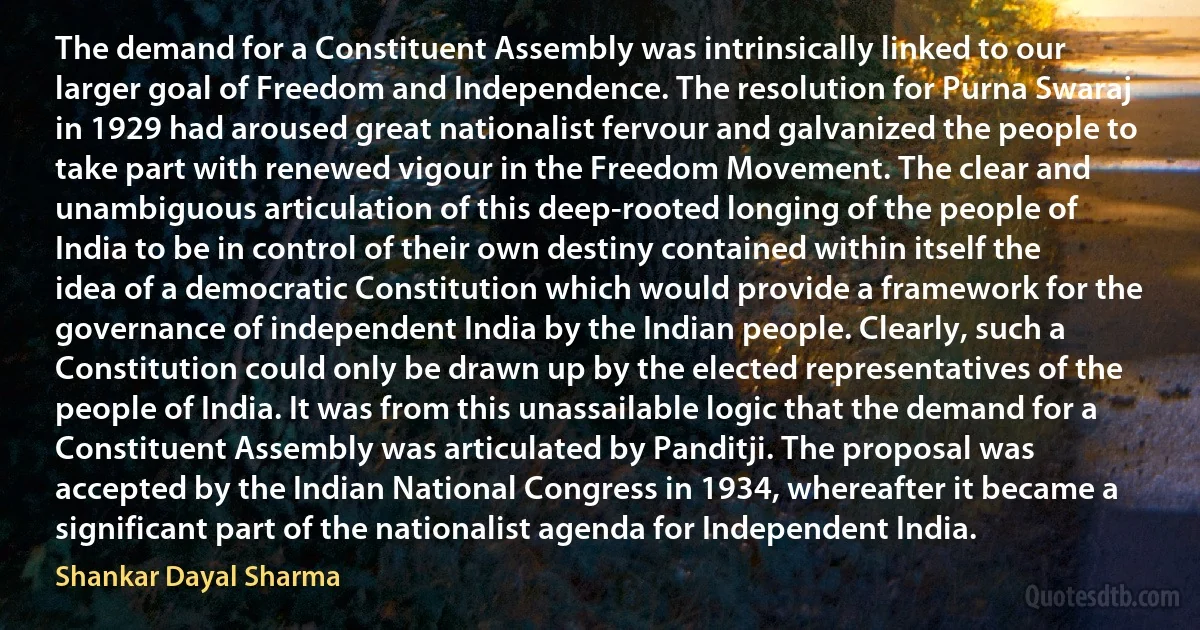
The demand for a Constituent Assembly was intrinsically linked to our larger goal of Freedom and Independence. The resolution for Purna Swaraj in 1929 had aroused great nationalist fervour and galvanized the people to take part with renewed vigour in the Freedom Movement. The clear and unambiguous articulation of this deep-rooted longing of the people of India to be in control of their own destiny contained within itself the idea of a democratic Constitution which would provide a framework for the governance of independent India by the Indian people. Clearly, such a Constitution could only be drawn up by the elected representatives of the people of India. It was from this unassailable logic that the demand for a Constituent Assembly was articulated by Panditji. The proposal was accepted by the Indian National Congress in 1934, whereafter it became a significant part of the nationalist agenda for Independent India.
Shankar Dayal SharmaRelated topics
agenda articulated articulation assembly clear congress constituent control democratic destiny draw freedom great idea national nationalist people significant take vigour fervour unassailable swarajRelated quotes
A true scholarship would examine, and then either accept or reject, with good reason, any new theory which challenges a generally accepted theory admitted to be full of sharp anomalies. However, this has not been the attitude of world scholarship towards our earlier book. The general attitude has been as follows: there is a school of crank scholarship in India which is out to prove, by hook or by crook, that India was the original homeland of the Indo-European family of languages; and the writers of this school deserve to be firmly put in their place. And the best method of doing this is by tarring all scholars who support, or even appear to support, an Indian homeland theory, with one brush; and then pointing out particularly untenable propositions made by one or the other of the scholars so branded together, to prove that all the scholars so named belong to one single school of irrational scholarship.

Shrikant Talageri
In some ways, though, the securing of civil rights, voting rights, the eradication of legalized discrimination -- the very significance of these victories may have obscured a second goal of the March. For the men and women who gathered 50 years ago were not there in search of some abstract ideal. They were there seeking jobs as well as justice, not just the absence of oppression but the presence of economic opportunity. For what does it profit a man, Dr. King would ask, to sit at an integrated lunch counter if he can't afford the meal? This idea -- that one's liberty is linked to one's livelihood; that the pursuit of happiness requires the dignity of work, the skills to find work, decent pay, some measure of material security -- this idea was not new. Lincoln himself understood the Declaration of Independence in such terms -- as a promise that in due time, "the weights should be lifted from the shoulders of all men, and that all should have an equal chance.”.

Barack Obama
His picture to me seems always to have the enthusiasm and freshness of youth, moved with the high-minded and patriotic purpose of maturity. He displayed the same ambition for faithful service, whether he was leading his soldiers in the last charge for American liberty at Yorktown or rebuking the mob at Paris for its proposal to make him king. His part in the French Revolution is well known. He served the cause of ordered liberty in America; he was unwilling to serve any other cause in France. His admirers might say of him on the first anniversary of Bastile Day, 'He is galloping through the ages' But he refused to be a man on horseback. He knew that the welfare of his country lay in moderation. The people trusted him, but the extremists, whether Jacobin or Royalist, feared him. He urged the National Assembly to establish by constitutional guarantees what the Revolution had gained.

Calvin Coolidge
If then the Courts of justice are to be considered as the bulwarks of a limited Constitution, against Legislative encroachments, this consideration will afford a strong argument for the permanent tenure of Judicial offices, since nothing will contribute so much as this to that independent spirit in the Judges, which must be essential to the faithful performance of so arduous a duty. This independence of the Judges is equally requisite to guard the Constitution and the rights of individuals, from the effects of those ill humors, which the arts of designing men, or the influence of particular conjunctures, sometimes disseminate among the People themselves, and which, though they speedily give place to better information, and more deliberate reflection, have a tendency, in the mean time, to occasion dangerous innovations in the Government, and serious oppressions of the minor party in the community.

Alexander Hamilton
They knew, however, that self-government is still government, and that the authority of the Constitution and the law is still authority. They knew that a government without power is a contradiction in terms. In order that their President and their Congress might not surpass the bounds of the authority granted to them, by the Constitution which the people had made, and so infringe upon the liberties of the people, they established a third independent department of the government, with the power to interpret and declare the Constitution and the law, the inferior courts and the Supreme Court of the United States. No President, however powerful, and no majority of Congress however large, can take from an individual, no matter how humble, that freedom and those rights which are guaranteed to him by the Constitution. The Supreme Court has final authority to determine all questions arising under the Constitution and laws of the United States.

Calvin Coolidge
